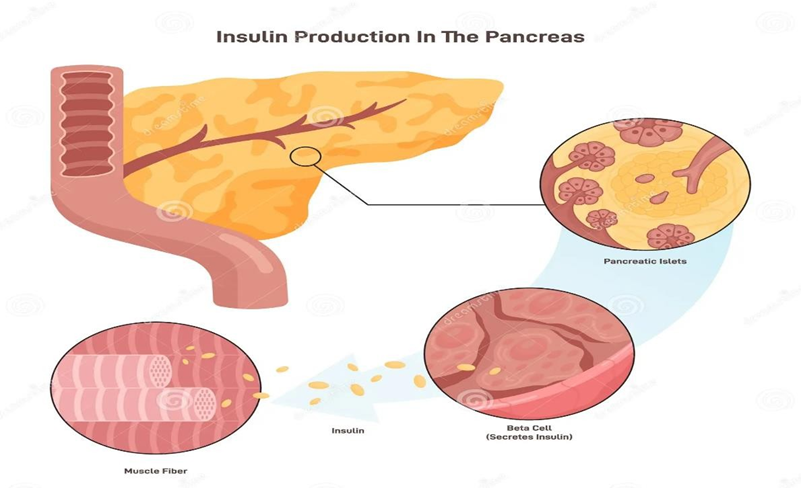What type of cells secrete insulin?
Alpha cells
Beta cells
Acinar cells
Plasma cells
The Correct Answer is B
B. Beta cells are the pancreatic cells responsible for secreting insulin. Insulin acts to lower blood sugar levels by facilitating the uptake of glucose into cells for energy or storage. In individuals with diabetes mellitus, dysfunction of beta cells can lead to inadequate insulin secretion, resulting in high blood sugar levels.
A. Alpha cells are another type of cell in the pancreas, but they secrete glucagon, not insulin. Glucagon has the opposite effect of insulin, increasing blood sugar levels by stimulating the breakdown of glycogen in the liver.
C. Acinar cells are exocrine cells found in the pancreas that secrete digestive enzymes into the pancreatic ducts. These enzymes aid in the digestion of food in the small intestine. Acinar cells are not involved in the production of insulin.
D. Plasma cells are a type of white blood cell that produces antibodies as part of the immune response. They are not involved in the production of insulin.

Nursing Test Bank
Naxlex Comprehensive Predictor Exams
Related Questions
Correct Answer is A
Explanation
A. Oatmeal is a good source of fiber, which can help manage blood sugar levels. Whole-grain toast provides complex carbohydrates and fiber, and using an artificial sweetener in oatmeal reduces sugar intake. Tea is a good beverage choice as it does not contain sugar or calories if not sweetened.
B. This option is less appropriate for a patient with diabetes. While eggs are a good source of protein, bacon is high in saturated fat and sodium, which is not ideal for cardiovascular health. Orange juice contains a high amount of natural sugar and can cause a rapid increase in blood glucose levels. Coffee is fine if consumed without sugar or high-fat creamers.
C. Whole-grain toast with peanut butter provides fiber, protein, and healthy fats, which are beneficial. Skim milk is a good source of calcium and protein. However, the inclusion of orange juice is problematic due to its high sugar content, which can spike blood sugar levels.
D. While grapefruit is a low-sugar fruit, cranberry juice often contains added sugars and can increase blood glucose levels. A bagel, even with sugar-free jelly, is high in refined carbohydrates, which can cause a rapid rise in blood sugar.
Correct Answer is B
Explanation
B. Nonsteroidal anti-inflammatory drugs (NSAIDs), including ibuprofen, are known to increase the risk of peptic ulcer formation by disrupting the protective mucosal barrier of the stomach and duodenum.
Long-term or frequent use of NSAIDs can lead to mucosal damage and ulceration.
A. Consuming spicy foods frequently may irritate the lining of the stomach and increase the risk of developing peptic ulcers. However, the number of consumed meals is not specific to the risl of peptic ulcer formation.
C. Green tea consumption is generally not considered a significant risk factor for peptic ulcers. In fact, some studies suggest that compounds found in green tea may have protective effects against the development of peptic ulcers and may help reduce the risk of H. pylori infection, a common cause of ulcers.
D. Bulimia, an eating disorder characterized by binge eating followed by purging behaviors such as vomiting, is a risk factor for peptic ulcers. The repeated exposure of stomach acid to the esophagus and stomach lining due to vomiting can lead to inflammation and ulceration of the gastrointestinal tract.
Whether you are a student looking to ace your exams or a practicing nurse seeking to enhance your expertise , our nursing education contents will empower you with the confidence and competence to make a difference in the lives of patients and become a respected leader in the healthcare field.
Visit Naxlex, invest in your future and unlock endless possibilities with our unparalleled nursing education contents today
Report Wrong Answer on the Current Question
Do you disagree with the answer? If yes, what is your expected answer? Explain.
Kindly be descriptive with the issue you are facing.
